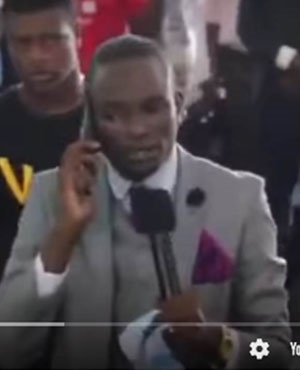A pastor claims he has God's phone number. Can he help us think differently about prayer?
As if Christians didn't already have enough of a reputation for being somewhere on the spectrum between mad and weird, we've now seen the emergence of a pastor who says he had God's personal phone number, and regularly calls him on his cell.
Zimbabwean Pastor Paul Sanyangore is the subject of a video currently doing the viral rounds, in which he claims to be talking to the Almighty himself, on behalf of a woman who has come to his church for prayer.

In the edited video, Sanyangore appears to receive accurate prophetic messages from the phone about the woman's family, to the delight of the feverishly-excited congregation at his Victory World International Ministries Church. Afterwards, he told a local news service: 'I actually have a direct line which I can call [God] on and get instructions on how to proceed.' He claims he was given the number while praying.
Clearly – while I don't doubt that in theory God could choose to communicate through anything, including a phone – Paul Sanyangore does not really have the number of a call box over by the Crystal Sea. The video seems to demonstrate behaviour consistent either with the sort of ear-piece televangelism which once got US televangelist Peter Popoff into trouble, or with the cold-reading techniques used by travelling 'psychics' and debunked by Derren Brown and others. Therefore it's disappointing, and actually a bit upsetting, that an influential Christian leader would be making such ridiculous and outlandish claims. Like those fraudulent TV evangelists, his act of personal attention-seeking both discredits the Church and adds another sprinkling of doubt to the prevailing cultural idea around Christians – that we're unthinking morons who might as well believe in the Flying Spaghetti Monster.
These stories – of pastors and other Christians who fabricate ridiculous stories, or make claims that are beyond reasonable substantiation – appear all too often. To be honest, they can get a bit wearisome. So perhaps instead of simply rolling our eyes and writing them off each time, we should be more engaged in trying to redeem them. Let's be absolutely crystal clear: Paul Sanyangore is not actually able to talk to God on his mobile phone. But is there perhaps some slim shred of truth behind his claim?
When we think about what it means to talk to God, most of us probably picture one of a few very similar scenes. Either we're on our own kneeling by the bed, or walking along quietly muttering, or we're in a prescribed church prayer context, gathered in a circle with our hands clasped to our heads in the shampoo position, desperately composing poetic words in the hope that we won't embarrass ourselves when it's our turn to pray. Now, Pastor Paul's definition of prayer might be a bit too wide, but it is at least liberated from the restrictive version we've imposed on ourselves in the modern church.
Humans communicate with each other in hundreds, perhaps even thousands of ways. Semaphore, sign language, dance, Twitter... each one is used because it seems more apt or useful to the people choosing it. Yet when it comes to communicating with God, suddenly all our creativity in communication seems to drain away. We speak words out loud, or we think them in our heads – I guess you'd call that some kind of supernatural telepathy. These two media probably account for 95-99 per cent of the prayers we offer to God.
In fact, he can hear us however we speak to him. So all those methods I've just mentioned could potentially be creatively turned to prayer (I'm particularly keen to see a movement of semaphore-based prayer), as could practically any other. We can write prayers, draw them, shout and sing them. We can write prayers in text-speak, emoji, slang or musical notation. And none of this simply for the sake of being a bit alternative, creative or kooky. We all favour different forms of communication and speak with more authenticity and depth when using those we prefer. So as a writer (allegedly), I find that writing out my prayers can take me into a much more deep form or prayer than merely speaking out words might; I'm sure artists and musicians would attest to a similar experience.
So don't just be utterly dumfounded by Pastor Paul. Allow yourself to be oddly inspired to try a new form of prayer: write out the social status update you'd love God to read, or tap out your requests in Morse code as an illustration of your commitment to taking time over your heaven-bound communication. Just don't imagine that God has a personal phone number, or that a rather unorthodox Zimbabwean pastor might have access to it. In a New Testament universe, God doesn't limit his conversation to the anointed few, through any sort of special device. He's listening to everyone, and I believe he does talk back... but not through a special hotline.
Martin Saunders is a Contributing Editor for Christian Today and the Deputy CEO of Youthscape. Follow him on Twitter @martinsaunders.











